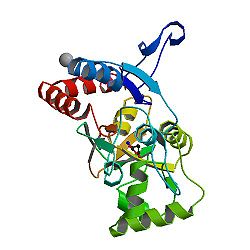- GRIA 2
-
Glutamate receptor, ionotropic, AMPA 2 Masse/Länge Primärstruktur 859 Aminosäuren Sekundär- bis Quartärstruktur multipass Membranprotein; Homo-/Heterotetramer Isoformen Flip, Flop, Long Bezeichner Gen-Namen GRIA2; GLUR2 Externe IDs OMIM: 138247 UniProt: P42262 MGI: 95809 Transporter-Klassifikation TCDB 1.A.10 Bezeichnung Glutamatgesteuerter Ionenkanal Vorkommen Homologie-Familie CG3822 PA Übergeordnetes Taxon Bilateria Orthologe Mensch Maus Entrez 2891 14800 Ensembl ENSG00000120251 ENSMUSG00000033981 UniProt P42262 Q4LG64 Refseq (mRNA) NM_000826 NM_001039195 Refseq (Protein) NP_000817 NP_001034284 Genlocus Chr chr4: 158.36 - 158.51 Mb Chr chr3: 80.77 - 80.89 Mb PubMed Suche [1] [2] Der Glutamate receptor, ionotropic, AMPA 2, auch bekannt als GRIA2, ist ein menschliches Protein.[1] Glutamat-Rezeptoren sind die vorherrschende Form der excitatorischen Neurotransmitter-Rezeptoren im Säugetier-Gehirn. Sie werden durch eine Vielzahl von neurophysiologischen Prozessen aktiviert. Dieses Membranprotein gehört zur Familie der Glutamat-Rezeptoren, die sensitiv für alpha-amino-3-hydroxy-5-methyl-4-isoxazole propionate (AMPA) sind. Es ist ein ligandenaktivierter Kationenkanal. Diese Kanäle sind aus den vier Untereinheiten GRIA1-4 zusammengesetzt. Bei dem Gen der Untereinheit GRIA2 ist ein RNA-Editing (CAG->CGG; Q->R) innerhalb des Abschnittes beschrieben, der für die zweite transmembranäre Domaine codiert. Vermutlich wird der Kanal dadurch Ca(2+)-impermeabel. Studien beim Menschen und Tierversuche legen nahe, dass das pre-mRNA Editing für die normale Funktion des Gehirns unabdingbar ist und dass Fehler beim RNA-Editing des GRIA2-Gens eine Rolle in der Verursachung der ALS spielen. Für dieses Gen wurde ein alternatives Spleißen beschrieben, was die Ausbildung sogenannter Flip-Flop Isoformen zur Folge hat, die sich in ihren Signalübermittlungseigenschaften unterscheiden.[1]
Siehe auch
Empfohlene Literatur
- Soundarapandian MM, Tu WH, Peng PL, et al.: ‘‘AMPA receptor subunit GluR2 gates injurious signals in ischemic stroke.’‘ in: Mol. Neurobiol. vol. 32,2 pg. 145–55 (2007) PMID 16215279
- Sun W, Ferrer-Montiel AV, Schinder AF, et al.: ‘‘Molecular cloning, chromosomal mapping, and functional expression of human brain glutamate receptors.’‘ in: Proc. Natl. Acad. Sci. U.S.A. vol. 89,4 pg. 1443–7 (1992) PMID 1311100
- McNamara JO, Eubanks JH, McPherson JD, et al.: ‘‘Chromosomal localization of human glutamate receptor genes.’‘ in: J. Neurosci. vol. 12,7 pg. 2555–62 (1992) PMID 1319477
- Sommer B, Keinänen K, Verdoorn TA, et al.: ‘‘Flip and flop: a cell-specific functional switch in glutamate-operated channels of the CNS.’‘ in: Science vol. 249,4976 pg. 1580–5 (1990) PMID 1699275
- Sommer B, Köhler M, Sprengel R, Seeburg PH: ‘‘RNA editing in brain controls a determinant of ion flow in glutamate-gated channels.’‘ in: Cell vol. 67,1 pg. 11–9 (1991) PMID 1717158
- Paschen W, Hedreen JC, Ross CA: ‘‘RNA editing of the glutamate receptor subunits GluR2 and GluR6 in human brain tissue.’‘ in: J. Neurochem. vol. 63,5 pg. 1596–602 (1994) PMID 7523595
- Köhler M, Kornau HC, Seeburg PH: ‘‘The organization of the gene for the functionally dominant alpha-amino-3-hydroxy-5-methylisoxazole-4-propionic acid receptor subunit GluR-B.’‘ in: J. Biol. Chem. vol. 269,26 pg. 17367–70 (1994) PMID 7545935
- Eastwood SL, Burnet PW, Beckwith J, et al.: ‘‘AMPA glutamate receptors and their flip and flop mRNAs in human hippocampus.’‘ in: Neuroreport vol. 5,11 pg. 1325–8 (1994) PMID 7919190
- Sun W, Ferrer-Montiel AV, Montal M: ‘‘Primary structure and functional expression of the AMPA/kainate receptor subunit 2 from human brain.’‘ in: Neuroreport vol. 5,4 pg. 441–4 (1994) PMID 8003671
- Higuchi M, Single FN, Köhler M, et al.: ‘‘RNA editing of AMPA receptor subunit GluR-B: a base-paired intron-exon structure determines position and efficiency.’‘ in: Cell vol. 75,7 pg. 1361–70 (1994) PMID 8269514
- McLaughlin DP, Cheetham ME, Kerwin RW: ‘‘Expression of alternatively-spliced glutamate receptors in human hippocampus.’‘ in: Eur. J. Pharmacol. vol. 244,1 pg. 89–92 (1993) PMID 8420792
- Srivastava S, Osten P, Vilim FS, et al.: ‘‘Novel anchorage of GluR2/3 to the postsynaptic density by the AMPA receptor-binding protein ABP.’‘ in: Neuron vol. 21,3 pg. 581–91 (1998) PMID 9768844
- Matsuda S, Mikawa S, Hirai H: ‘‘Phosphorylation of serine-880 in GluR2 by protein kinase C prevents its C terminus from binding with glutamate receptor-interacting protein.’‘ in: J. Neurochem. vol. 73,4 pg. 1765–8 (1999) PMID 10501226
- Hirai H, Matsuda S: ‘‘Interaction of the C-terminal domain of delta glutamate receptor with spectrin in the dendritic spines of cultured Purkinje cells.’‘ in: Neurosci. Res. vol. 34,4 pg. 281–7 (2000) PMID 10576550
- Aruscavage PJ, Bass BL: ‘‘A phylogenetic analysis reveals an unusual sequence conservation within introns involved in RNA editing.’‘ in: RNA vol. 6,2 pg. 257–69 (2000) PMID 10688364
- Osten P, Khatri L, Perez JL, et al.: ‘‘Mutagenesis reveals a role for ABP/GRIP binding to GluR2 in synaptic surface accumulation of the AMPA receptor.’‘ in: Neuron vol. 27,2 pg. 313–25 (2000) PMID 10985351
- Chung HJ, Xia J, Scannevin RH, et al.: ‘‘Phosphorylation of the AMPA receptor subunit GluR2 differentially regulates its interaction with PDZ domain-containing proteins.’‘ in: J. Neurosci. vol. 20,19 pg. 7258–67 (2001) PMID 11007883
- Armstrong N, Gouaux E: ‘‘Mechanisms for activation and antagonism of an AMPA-sensitive glutamate receptor: crystal structures of the GluR2 ligand binding core.’‘ in: Neuron vol. 28,1 pg. 165–81 (2000) PMID 11086992
- Krampfl K, Schlesinger F, Zörner A, et al.: ‘‘Control of kinetic properties of GluR2 flop AMPA-type channels: impact of R/G nuclear editing.’‘ in: Eur. J. Neurosci. vol. 15,1 pg. 51–62 (2002) PMID 11860506
- Hirbec H, Perestenko O, Nishimune A, et al.: ‘‘The PDZ proteins PICK1, GRIP, and syntenin bind multiple glutamate receptor subtypes. Analysis of PDZ binding motifs.’‘ in: J. Biol. Chem. vol. 277,18 pg. 15221–4 (2002) PMID 11891216
Einzelnachweise
- ↑ a b Entrez Gene: GRIA2 glutamate receptor, ionotropic, AMPA 2. Abgerufen am 31. Dezember 2010.
Wikimedia Foundation.

